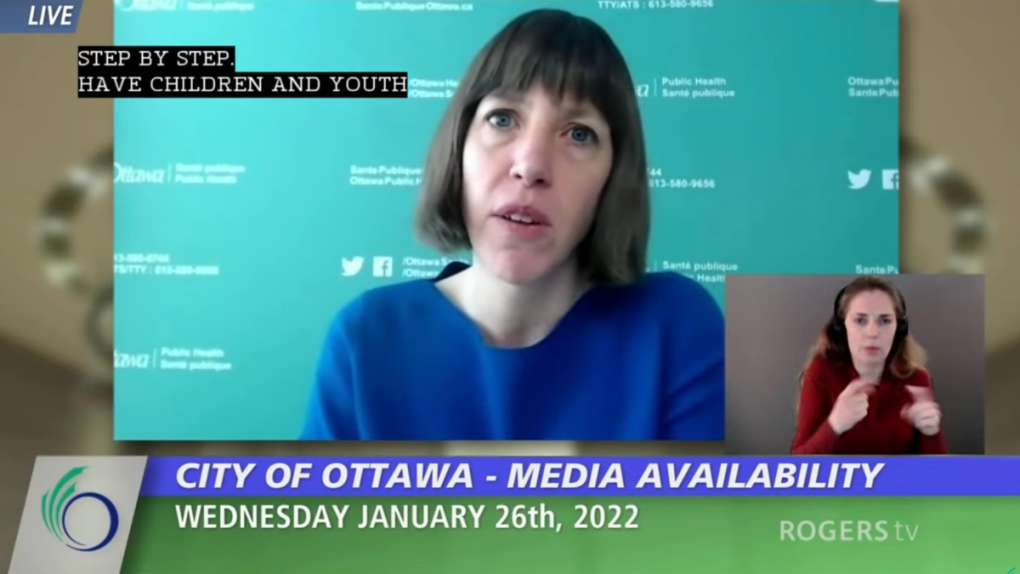Ottawa Public Health proactively monitoring absenteeism rates in schools, Etches says
 Medical officer of health Dr. Vera Etches speaks with reporters on Wednesday.
Medical officer of health Dr. Vera Etches speaks with reporters on Wednesday.
Ottawa's top doctor says Ottawa Public Health will not wait for schools to report absenteeism rates above 30 per cent before investigating a possible COVID-19 outbreak in schools.
As students returned to in-person learning last week, the Ontario government said principals are only required to report possible COVID-19 outbreaks at schools when absenteeism rates hit 30 per cent.
However, medical officer of health Dr. Vera Etches says Ottawa Public Health is proactively looking at the absenteeism rates itself and, "not waiting for the 30 per cent threshold."
"Where we see that they're higher, we're reaching out to schools to understand what's behind that," said Etches on Wednesday.
"We’d like to know is it because many people are choosing to do online learning, is it because we have an illness, is it because it’s something else. We’re trying to understand is it all in one class, is it across many because if we see concerning patterns of transmission there may be practices we need to reinforce, there may be situations where the exposures could have been higher risk so we want to address these things."
Ottawa Public Health's school nurses, public health inspectors and an infection prevention and control team are monitoring COVID-19 cases in schools to support the transition back to school during the Omicron wave of the COVID-19 pandemic.
As of Wednesday at 10:30 a.m., five Ottawa schools had an absenteeism rate of 30 per cent or more.
- Ottawa Carleton District School Board Adult High School – 37.8 per cent
- Clifford Bowey Public School – 31.5 per cent
- Frederick Banting Secondary Alternative School – 33.3 per cent
- Regina Street Alternative School – 30 per cent
- York Street Public School – 31.9 per cent
“The context I’m operating in is that we are looking at the transmissibility of this virus and trying to minimize morbidity and mortality as well as maintain essential services," said Etches.
"So school being an essential service for children and youth, the disruption of learning is there when whole cohorts are dismissed."
The medical officer of health says screening every day, masking and physical distancing can slow down the introduction and transmission of COVID-19 in schools.
“Dismissal of cohorts doesn’t stop transmission, it won’t stop transmission necessarily. The community surrounding levels of COVID are an ongoing source of introduction into schools. So the first thing we have to do every day is check whether we have symptoms that could be COVID," said Dr. Etches.
"Overall, we are not aiming for a COVID zero environment; we are aiming for migrating the harms and protecting the people at higher risk.”
Etches: Stay cautious
With students back in school for in-person learning, the medical officer of health is asking parents and guardians to limit interactions outside of school so kids can remain in the class.
"I would like to see us approach all of our interactions with caution still. We still have high levels of COVID-19 in the community," said Etches.
"My recommendation for families is to prioritize the school settings, knowing there can be exposure in schools and think carefully about what other exposures are added in in the community setting."
Dr. Etches says social and sports activities are important for a child's health.
"We're just trying to proceed step-by-step, have children and youth back in school, get them after that back to the activities that make a difference for them as well."
CTVNews.ca Top Stories

More than 115 cases of eye damage reported in Ontario after solar eclipse
More than 115 people who viewed the solar eclipse in Ontario earlier this month experienced eye damage after the event, according to eye doctors in the province.
Toxic testing standoff: Family leaves house over air quality
A Sherwood Park family says their new house is uninhabitable. The McNaughton's say they were forced to leave the house after living there for only a week because contaminants inside made it difficult to breathe.
Decoy bear used to catch man who illegally killed a grizzly, B.C. conservation officers say
A man has been handed a lengthy hunting ban and fined thousands of dollars for illegally killing a grizzly bear, B.C. conservation officers say.
B.C. seeks ban on public drug use, dialing back decriminalization
The B.C. NDP has asked the federal government to recriminalize public drug use, marking a major shift in the province's approach to addressing the deadly overdose crisis.
OPP responds to apparent video of officer supporting anti-Trudeau government protestors
The Ontario Provincial Police (OPP) says it's investigating an interaction between a uniformed officer and anti-Trudeau government protestors after a video circulated on social media.
An emergency slide falls off a Delta Air Lines plane, forcing pilots to return to JFK in New York
An emergency slide fell off a Delta Air Lines jetliner shortly after takeoff Friday from New York, and pilots who felt a vibration in the plane circled back to land safely at JFK Airport.
Sophie Gregoire Trudeau on navigating post-political life, co-parenting and freedom
Sophie Gregoire Trudeau says there is 'still so much love' between her and Prime Minister Justin Trudeau, as they navigate their post-separation relationship co-parenting their three children.
Last letters of pioneering climber who died on Everest reveal dark side of mountaineering
George Mallory is renowned for being one of the first British mountaineers to attempt to scale the dizzying heights of Mount Everest during the 1920s. Nearly a century later, newly digitized letters shed light on Mallory’s hopes and fears about ascending Everest.
Loud boom in Hamilton caused by propane tank, police say
A loud explosion was heard across Hamilton on Friday after a propane tank was accidentally destroyed and detonated at a local scrap metal yard, police say.






























